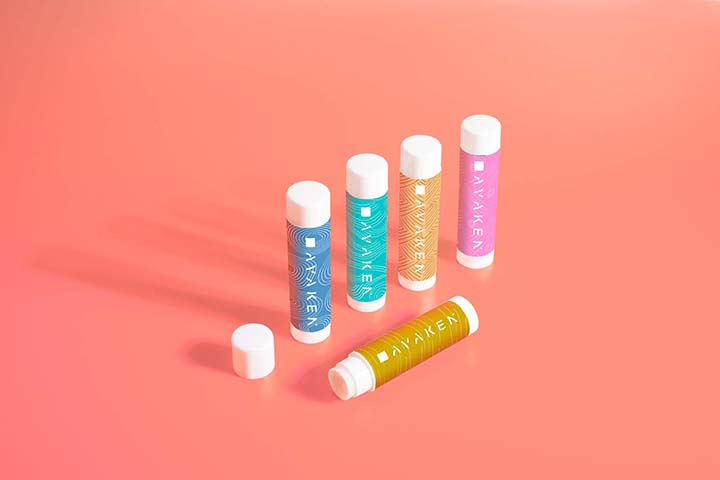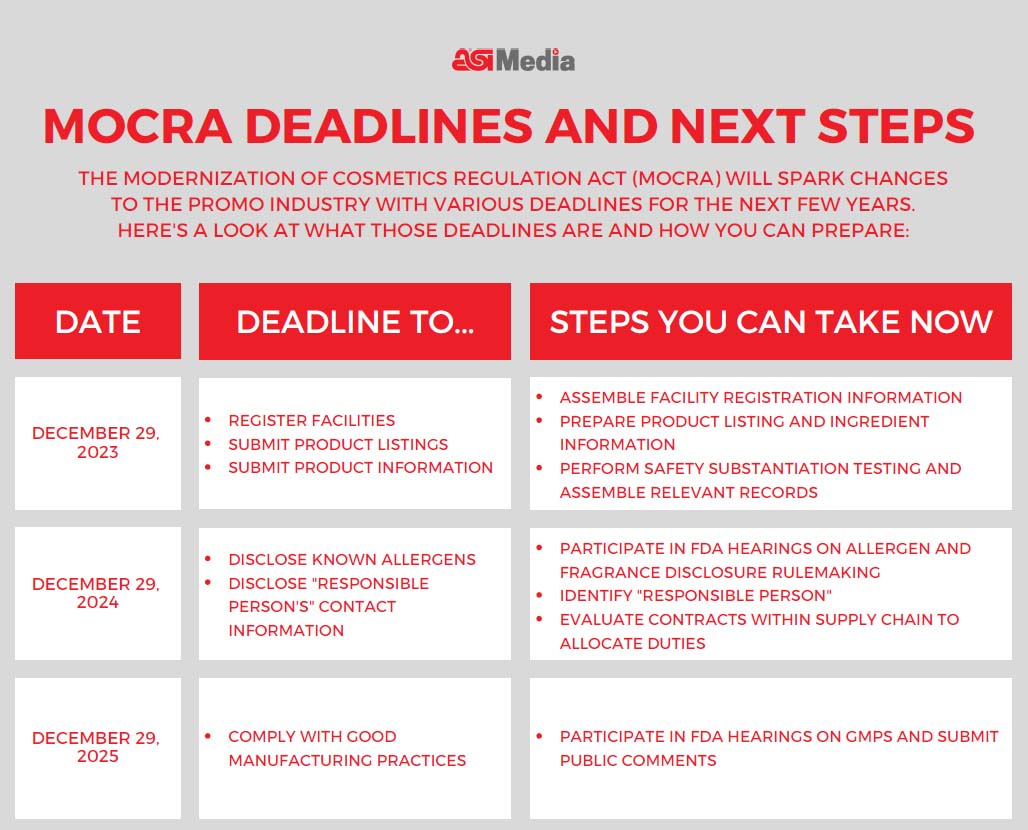Strategy August 18, 2023
MoCRA Sets New Cosmetics Regulations To Implement by Year’s End
The Modernization of Cosmetics Regulation Act was signed into law to ensure quality and safety of cosmetics. Here’s what the promo industry needs to know.
The Modernization of Cosmetics Regulation Act (MoCRA) was signed into law in December 2022 as the most significant change to cosmetics regulation since 1939. With implementation deadlines coming up at the end of this year, companies that manufacture or sell cosmetic products should understand how the changes will affect operations.
Before MoCRA, the Food and Drug Administration (FDA) had limited enforcement authority, but this act changes its power dramatically. Cosmetic regulation requirements will now become as extensive as those of food, drugs and medical devices.
“It is the first meaningful regulation in a very, very long time, so that in and of itself makes it a big deal,” says Aaron Irvin, vice president of product development at Top 40 supplier HPG (asi/61966). “Anytime we can do something that ensures that our customers and our customers’ customers have confidence in the quality, efficacy and safety of the products that we’re producing, I think that’s a good thing.”
The new regulations primarily apply to companies who manufacture cosmetics, but distributors should also educate themselves on the requirements. The FDA will be able to seize products, issue recalls and take action against companies that distribute misbranded items, even if the company isn’t responsible for the misbranding.
So how do you guarantee you’re following safety requirements? Here’s what to know:
How Do I know If I Sell Cosmetics?
Before you start planning for changes, check to make sure your product classifies as a cosmetic, which determines whether MoCRA pertains to your product. MoCRA defines a cosmetic as:
- An article intended to be rubbed, poured, sprinkled or sprayed on, introduced into or otherwise applied to the human body or any part thereof for cleansing, beautifying, promoting attractiveness or altering appearance.
- An article intended for use as a component of any such articles.
The term cosmetic refers to more than just things like mascara – the FDA’s definition includes products like lotions, face washes and dry shampoo.

Lip moisturizers like these from HPG will fall under MoCRA’s regulations.
Products that are regulated as drugs and medical devices are exempt from MoCRA. Over-the-counter products with cosmetic-intended use like sunscreens or dandruff shampoos also aren’t included in these regulations. Brandon Mackay, CEO of Top 40 supplier SnugZ USA (asi/88060), says his company’s products that make a claim like blocking the sun’s rays or killing bacteria don’t classify as a cosmetic.
Seth Mailhot, a partner at the law firm Husch Blackwell, says manufacturers should reach out to counsel if they have any doubt over whether their product meets the definition, but generally if the item is intended for a cosmetic purpose, MoCRA regulations apply.
What Are the Implications for the Promo Industry?
MoCRA is the FDA’s next step in making sure cosmetics are safe for consumers and made with integrity, according to Rachel Cron, quality director at Raining Rose (asi/80489). Here are the main aspects to ensure businesses are doing what they can to protect consumers:
- Facility registration: Manufacturers who produce cosmetics need to register with the FDA by the end of 2023.
- Good manufacturing practices: Manufacturers will need to comply with the Good Manufacturing Practices implemented by the FDA, which have yet to be decided.
- Responsible person: For each cosmetic product, you’ll need to determine the “responsible person” who will appear on the label, whether that’s the supplier or distributor. The business that is listed on the label will be responsible for things like responding to the FDA and customer complaints, understanding the policies and procedures for keeping track of safety substantiation.
- Product registration: If you’re listed as the responsible person of a business that has annual cosmetic sales above $1 million, you need to register your product with the FDA.
- Adverse event reporting: The responsible person will need to report any adverse side effects from cosmetic products they sell to the FDA no later than 15 business days after the report is received.
- Product safety: The responsible person will need to produce proof that the products they sell are safe. This can be in the form of tests or studies, research, analyses or other scientific evidence.
- Labeling: Cosmetic product labels now must include a domestic address, phone number, website or electronic contact information for adverse events to be reported. Labels must identify fragrance allergens based on a list the FDA is still developing.
- FDA recall responsibility: If the FDA has reasonable belief that a cosmetic presents a risk of serious adverse health consequences, it will give the responsible person the opportunity to voluntarily cease distribution and recall the product.
How Should Distributors React to MoCRA?
While most of the execution falls on the manufacturer, distributors should also understand MoCRA’s implications so they can be clear about what their requirements are.
Kate Nash, director of promotional sales and marketing at Raining Rose, says distributors should ask their suppliers how they’re preparing for MoCRA. And if they’re going to be listed as the responsible person, they need to understand their responsibilities to comply.
Irvin of HPG says he thinks the promo industry will benefit because everyone will be held to the same standards. To that degree, distributors can also make it clear they’re only going to work with MoCRA-conforming facilities to make sure everyone is safe.
Mackay of SnugZ agrees that distributors should educate themselves on the changes so they can buy the best products on behalf of the end user.
“The lowest price does not mean best product, so they need to really search out and find partners that are complying,” Mackay says.

How Should I Prepare and Stay Updated?
Cron of Raining Rose recommends that businesses monitor the FDA website and newsletters because no one is sure when all the updates will be released.
“The earlier or more quickly we can adapt to what they’re putting out, the better the outcome will be and the faster we can align with these regulations and be in compliance,” Cron adds.
If you’re concerned with how compliance is going to affect you, Magda Patitsas, partner at Husch and Blackwell, says it’s a good idea to participate in public comments because the FDA is supposed to make sure these regulations aren’t overly burdensome.
Companies that aren’t used to FDA regulations should watch the informative webinars and recorded calls, Mackay says. While it sounds daunting at first, he adds that it’s just about setting aside part of your day to do the research that ensures you’ll provide compliant products.
“Sometimes promo gets kind of a bad rap, but the truth is that a lot of suppliers are very, very proactive, distributors as well, in terms of going the extra mile and making sure their products are safe,” Irvin says. “This will just be another area where I think the industry can demonstrate its commitment to having safe products.”
